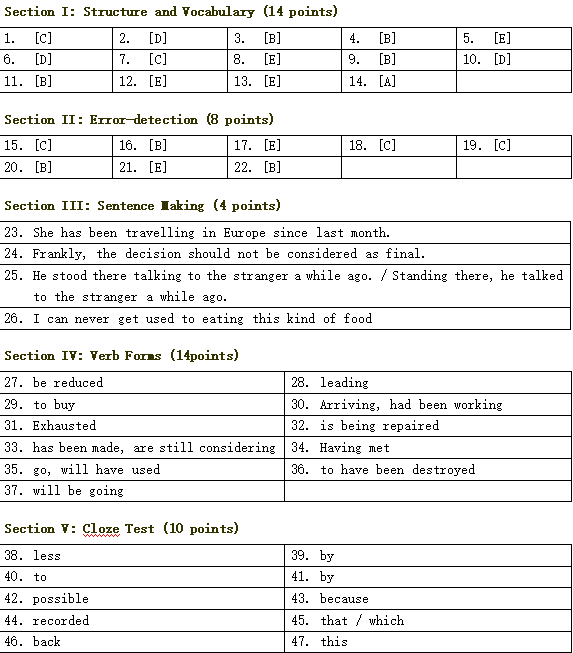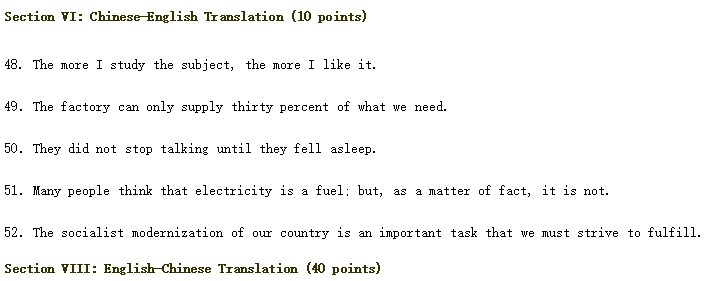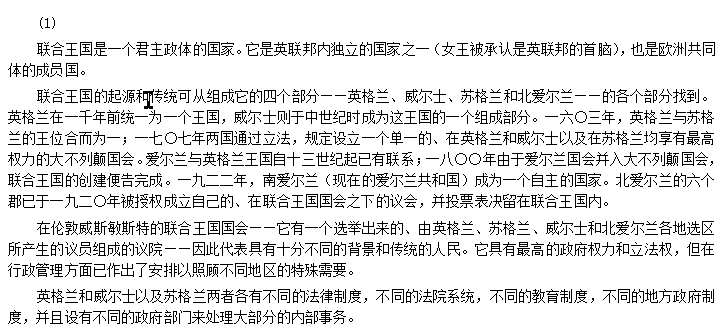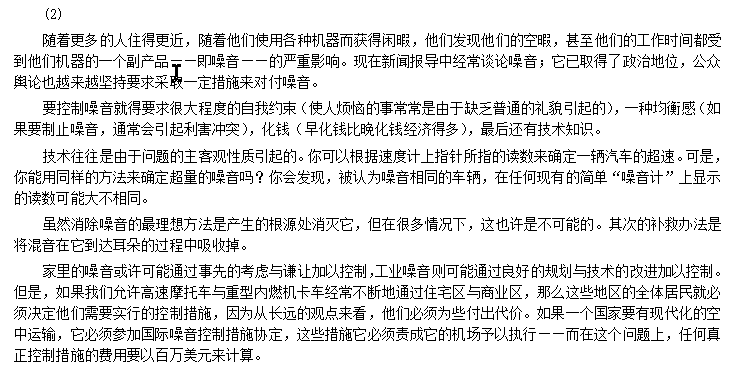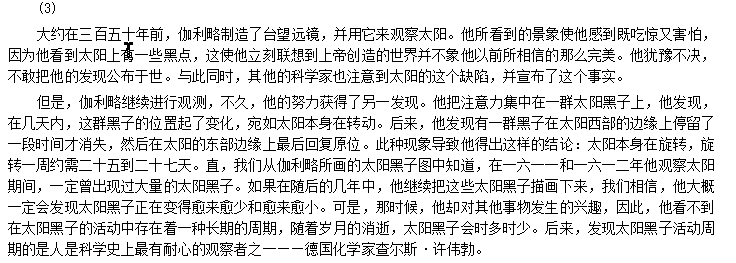当前位置:首页 > 考研频道 > 考研真题 > 1981年全国硕士研究生入学统一考试英语试题
发布时间:2021-03-19 关键词:研究生入学统一考试,英语试题
摘要:多练以前的真题,才能了解自己的水平。给大家整理了1981年全国硕士研究生入学统一考试英语试题+答案。
1981年全国硕士研究生入学统一考试英语试题
Section I Structure and Vocabulary
In each question, decide which of the five choices given would most suitably complete the sentence. Circle the letter before your choice. Only one choice is to be circled (14 points)
EXAMPLE:
The guests said that they wouldn’t mind ________.
[A] to have a little light music
[B] having a little light music
[C] have a little light music
[D] if they have a little light music
[E] that they have a little light music
ANSWER: [B]
1. She has been working in this factory ________.
[A] after 1968
[B] in 1968
[C] since 1968
[D] for 1968
[E] until 1968
2. We can’t understand why he avoided ________ to us.
[A] to speak
[B] speech
[C] having spoken
[D] speaking
[E] to have spoken
3. I am interested in ________ you have told me.
[A] which
[B] all that
[C] all what
[D] that
[E] everything of which
4. It is because she is too inexperienced ________ she does not know how to deal with the situation.
[A] so
[B] that
[C] so that
[D] therefore
[E] that is why
5. He was afraid he would have to ________ her invitation to the party.
[A] refute
[B] refuse
[C] return
[D] ignore
[E] decline
6. She wants to know whether the measures have been agreed ________.
[A] to
[B] with
[C] about
[D] upon
[E] over
7. Since she is angry, we ________.
[A] had better leaving her alone
[B] should leave her alone
[C] might as well leave her alone
[D] had rather leave her alone
[E] must leave her alone
8. I wish I ________ to the movies with you last night.
[A] went
[B] did go
[C] could go
[D] have gone
[E] could have gone
9. Scarcely had they settled themselves in their seats in the theatre ________ the curtain went up.
[A] than
[B] when
[C] before
[D] as soon as
[E] as
10. Write clearly ________ your teacher can understand you correctly.
[A] since
[B] for
[C] because
[D] so that
[E] then
11. If the doctor had been available, the child ________.
[A] would not die
[B] would not have died
[C] could not die
[D] could not have died
[E] should not have died
12. I’d just as soon ________ rudely to her.
[A] that you won’t speak
[B] your not speaking
[C] you not speak
[D] you hadn’t spoken
[E] you didn’t speak
13. Ten years had elapsed. I found she had ________.
[A] a little white hair
[B] some white hair
[C] much white hair
[D] a few white hair
[E] a few white hairs
14. The electric shaver ________ before it can be used.
[A] needs repairing
[B] requires to be repaired
[C] should be in repair
[D] has to be repairable
[E] must repair
Section II Error-detection
Each question consists of a sentence with five underlined parts (words or phrases). These parts are labeled [A], [B], [C], [D] and [E]. Choose the part of the sentence that is incorrect and circle the letter of your choice. Only one choice is to be marked. (8 points)
EXAMPLE:
We didA the research as goodB as we couldC; howerverD, it did not turn outE to be satisfactory.
ANSWER: [B]
15. The president of the collegeA, together withB the deans, areC planning a conference forD the purpose of laying downE certain regulations.([C] approve of)
16. In order toA convince the director to agree withB their plan, they brought forthC a number of reports whichD supportedE their argument.([C] approve of)
17. His method ofA doingB research work is hardlyC appreciated; he feelsD inferior thanE others.([C] approve of)
18. A series of debatesA betweenB the lecturers wereC scheduled forD the next weekendE.([C] approve of)
19. The automobile industry is manufacturingA a new typeB of a motorC that will consume lessD gasoline and causeE much less pollution.([C] approve of)
20. When his plane arrivesA onB the airport in ShanghaiC, I shall already have leftD forE Beijing.([C] approve of)
21. The industrial trendA isB inC the direction of moreD machines and lessE people.([C] approve of)
22. The workers wereA alreadyB to work longC before heD arrivedE.
Section III Sentence Making
Combine the given words and phrases into sentences. (4 points)
EXAMPLE:
His sons / he / their grandmother / to see / just before his last birthday / take
ANSWER:
Just before his last birthday he took his sons to see their grandmother.
23. last month / in Europe / travel / she / since
24. the decision / as final / frankly / should / not consider
25. to the stranger / talk / there / stand / a while ago / he
26. this kind of / can / get used to / I / never / food / eat
Section IV Verb Forms
Fill in the blanks with the appropriate forms of the verb given in parentheses. (14 points)
EXAMPLE:
“Those,” he said, ________ (point) to the books ________ (pile) on the desk, “________ (need) over there now.”
ANSWER: pointing; piled; are needed
Thousands of years ________ (pass) since then; but people still ________ (like) ________ (tell) the story of Leonidas and the brave three hundred who ________ (dedicate) their lives to their country.
ANSWER: have passed; like; to tell; dedicated
27. The public demanded that the prices ________ (reduce).(were defeated/had been defeated)
28. With the guide ________ (lead) the way, we set off on foot into the dark night.(were defeated/had been defeated)
29. I need that book badly. If you go to the bookshop this afternoon, please remember ________ (buy) a copy for me.(were defeated/had been defeated)
30. ________ (arrive) home at daybreak, he felt dead tired. He ________ (work) all night.(were defeated/had been defeated)
31. ________ (exhaust) by his work, he lay down on the bed to take a rest.(were defeated/had been defeated)
32. We’ll have to take a roundabout course, for the road ________ (repair).(were defeated/had been defeated)
33. No decision ________ (make) about that matter yet. We ________ (still consider) it.(were defeated/had been defeated)
34. ________ (meet) Tom earlier today, I don’t need to see him again.(were defeated/had been defeated)
35. If you ________ (go) on at the present rate, you ________ (use) up all the petroleum by the end of the month.(were defeated/had been defeated)
36. The building is said ________ (destroy) in a fire two years ago.
37. The car ________ (go) at the present speed until it reaches the foot of the mountain at about ten o’clock tonight.
Section V Cloze Test
Fill in the blanks with proper words (10 points)
In recent years television has become the most popular form of entertainment. It does not look as if it will be popular in the world of the future. In fact it looks as if television will become more popular than ever. New systems of television have been made possible the discovery of the laser. A laser is a beam of light that has many strange qualities. By using a laser, it is possible to throw every large and very clear television pictures on a screen. These pictures may be as large as three meters . Many people could watch this kind of television together.
Laser beams have also made very thin television sets . These sets can be hung on the wall of a room like a large picture. Another development in the future will be three dimensional television; the picture will look more ‘real’ it will have depth as well as height and length.
In the near future you will be able to buy your favourite television programmes already on tapes. They will be like the tapes are used in small cassette tape recorders today. You will also be able to record television programmes and play them later. The laser beam will make possible.
Section VI Chinese-English Translation
Translate the following into English. (10 points)
48. 这门课我们越学越喜欢。
49. 这家工厂只能供应我们所需要的百分之三十。
50. 他们一直谈到入睡。
51. 许多人以为电是燃料,但事实上并非如此。
52. 我国的社会主义现代化是一项我们必须努力完成的任务。
Section VII English-Chinese Translation
Choose one of the following three passages and translate it into Chinese. (40 points)
(1)
The United Kingdom is a monarchical (君主政体的) State. It is one of the independent members of the Commonwealth (the Queen is recognized as head of the Commonwealth), and a member of the European Community.
The origins and traditions of the United Kingdom are to be found in each of the four parts that make up the country: England, Wales, Scotland and Northern Ireland. England was united as a kingdom a thousand years ago, and Wales became part of the kingdom during the middle ages. The thrones (王位) of England and Scotland were united in 1603, and in 1707 legislation passed in the two countries provided for the establishment of a single Parliament of Great Britain with supreme authority both in England and Wales and in Scotland. Ireland had had links with the kingdom of England since the thirteenth century, and in 1800 the creation of the United Kingdom was completed by a union joining the Irish Parliament to that of Great Britain. In 1922 Southern Ireland (now the Irish Republic) became a self-governing country. The six counties of Northern Ireland had in 1920 been given their own subordinate Parliament, and voted to remain within the United Kingdom.
The United Kingdom Parliament at Westminster in London — with an elected chamber comprising members from English, Scottish, Welsh and Northern Ireland constituencies (选举区) — therefore represents people sharing very varied backgrounds and traditions. It has ultimate authority for government and law-making, but administrative arrangements have developed in such a way as to take account of the particular needs of different areas.
England and Wales on the one hand and Scotland on the other have different systems of law, different court systems, different education systems, different systems of local government and, for most domestic matters, different government departments.
(2)
As more people live closer together, and as they use machines to produce leisure, they find that their leisure, and even their working hours, become spoilt by a by-product of their machines — namely, noise. Noise is nowadays in the news; it has acquired political status, and public opinion is demanding, more and more insistently, that something must be done about it.
To control noise is to demand much self-discipline (annoyance arises often from lack of common courtesy), a sense of proportion (there is usually a conflict of interest if a noise is to be stopped), the expenditure of money (and it is far more economical to do this early rather that late), and finally, technical knowledge.
Technical difficulties often arise from the subjective-objective nature of the problem. You can define the excessive speed of a motor-car in terms of a pointer reading on a speedometer. But can you define excessive noise in the same way? You find that with any existing simple “noise-meter”, vehicles which are judged to be equally noisy may show considerable difference on the meter.
Though the ideal cure for noise is to stop it at its source, this may in many cases be impossible. The next remedy is to absorb it on its way to the ear.
Domestic noises may perhaps be controlled by forethought and courtesy, and industrial noises by good planning and technical improvement. But if we are going to allow fast motor-cycles and heavy diesel lorries to pass continuously trough residential and business districts, the community must decide on the control it needs to exercise, for in the long run it has got to pay for it. And if a nation is to take part in modern air transport, it must enter into international agreements on the noise control measures it will impose at its airports — and here the cost of any real control is to be measured in millions of dollars.
(3)
About 350 years ago Galileo made a telescope and looked through it at the sun. What he saw both surprised and frightened him, for he saw dark spots on the sun which at once suggested to him that God had not made the world quite as perfect as he had previously believed. He hesitated to make his discovery known. Meanwhile other scientists noticed the same lack of solar perfection and proclaimed (宣布) the fact.
But Galileo continued his observations and was soon rewarded with another discovery. Fixing his attention on a single sunspot (太阳黑子) group, he noticed that in a few days it had moved in position, just as if the sun itself were turning. Afterwards he found a sunspot group which lived long enough to disappear from view on the western limb (边缘) of the sun, to re-appear on its eastern limb, and finally to regain its old position. This led him to conclude that the sun itself was rotating and that the time it took to make one complete turn was about twenty-five to twenty-seven days. Actually we know from the drawings which Galileo made of sunspots that there must have been quite a lot of them at the time of his observations in the years 1611 and 1612. If he had gone on making his drawings in the years that immediately followed, we know that he would almost certainly have noticed that sunspots were becoming fewer and smaller. But he became interested in other things and so he failed to recognize that there is a kind of long-term cycle in sunspot activity, the sunspots increasing and decreasing as the years go on. Later this discovery of the sunspot activity was made by one of the most patient observers in the history of science, a German chemist, Charles Schwabe.
1981年考研英语真题答案
